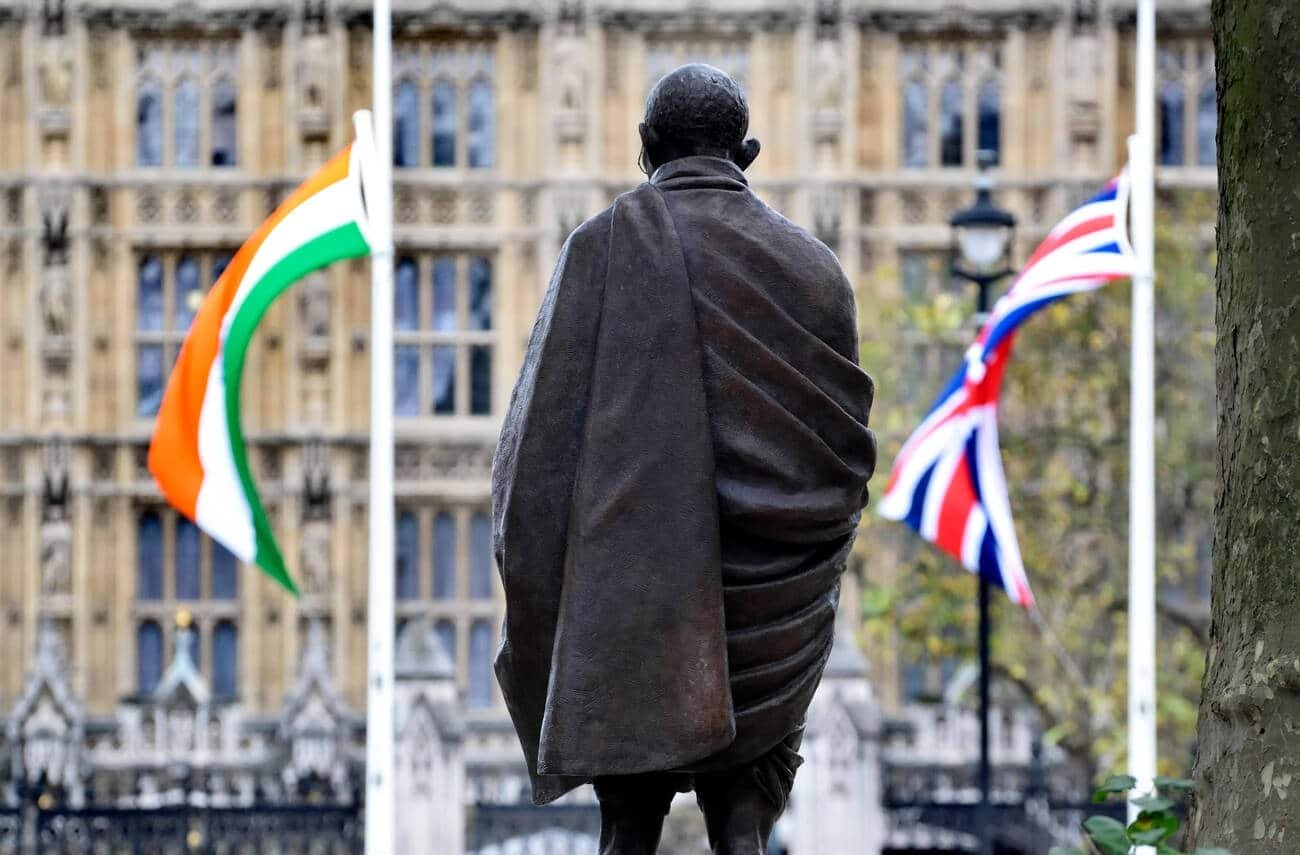
Gandhi’s Teachings: A Beacon of Hope in a World of Chaos
Anuranjan Jha (Chairman and president), Dhruva Kumar (General Secretary- Gandhian Peace Society)
(Gandhian Peace Society, SC052875 is an official registered charity in the United Kingdom, the first of its kind in Scotland. The mission of the Gandhian Peace Society is to promote the idea that non-violence is the most effective means of achieving social change. The organisation accomplishes this mission through various programs and initiatives, including educational programs, community outreach, and advocacy.)
This article intends to capture the essence of the importance of Gandhian principles and thoughts in today’s world. It highlights the universality of his ideas and the practicality of his approach to problem-solving Gandhi’s philosophy of non-violence, truth, and inclusivity is fundamental to building a better world, and his warnings against unrestricted industrialism and exploitation of nature for human greed are still relevant today in the 21st Century and for good. His ideas have an element of universality, and the zeal with which these ideas were used back in those days makes us realise their significance in contemporary times.
Gandhian principles and thoughts are more relevant than ever because they offer a way of living and acting based on moral values, social justice, and peaceful coexistence. Gandhi’s philosophy of Truth, Non-violence, Sarvodaya, Satyagraha and Saralata can inspire and guide individuals and movements in the present times when the world is facing many challenges, such as violence, injustice, inequality, environmental degradation, and intolerance.
We believe Gandhi’s Philosophy is more relevant than ever in the 21st Century, and we will give you some stats and data to prove it. Some of the reasons are:
Non-violence: Ahinsa, or non-violence, was the core of Gandhi’s philosophy. It meant refraining from causing harm to any living being, both physically and mentally, and striving for harmony and peaceful coexistence³. In a world where violence, war, terrorism, and hatred are widespread, Gandhi’s principle of non-violence can help us to resolve conflicts peacefully, respect the dignity and rights of all living beings, and promote a culture of peace and compassion.
Gandhi’s non-violent resistance inspired other leaders such as Martin Luther King Jr., Nelson Mandela, and Dalai Lama, who also fought for civil rights, freedom, and democracy in their respective countries. According to the Global Peace Index, which ranks 163 countries based on their level of peacefulness, the most peaceful countries in the world are also the ones that have the lowest levels ofmilitarisation, homicide, violent crime, and political instability. The report also estimates that the economic cost of violence in 2020 was $14.96 trillion, or 11.6% of the global GDP. This shows that non-violence is not only a moral duty, but also a practical necessity for the well-being and prosperity of humanity.
Sarvodaya: Sarvodaya is a term meaning ‘Universal Uplift’ or ‘Progress of All’. It is based on the idea that the welfare of the individual is linked to the interest of the society and that the society should beorganised in such a way that it benefits the poorest and the weakest⁴. In a world where poverty, inequality, and exploitation are prevalent, Gandhi’s Sarvodaya concept can help us work for the common good, ensure social justice and equity, and empower themarginalised and oppressed sections of society.
According to the World Happiness Report, which ranks 149 countries based on their level of happiness, the happiest countries in the world are also the ones that have the highest levels of social support, generosity, and trust. The report also found that the COVID-19 pandemic has had a negative impact on the mental health and well-being of millions of people, especially those who are isolated, lonely, and vulnerable. This shows that compassion and service are not only a moral obligation but also a source of joy and fulfilment for ourselves and others.
Satyagraha: Satyagraha is a means or strategy adopted by Gandhi in his struggles. It means insistence on truth or holding onto truth. It is a form of non-violent resistance or civil disobedience that involves appealing to the opponent’s conscience, and using moral force rather than physical force to achieve one’s goals.
Truth: Gandhi considered truth as the foundation of all other virtues. He believed in speaking the truth, seeking truth in all aspects of life, and living a life of honesty and integrity³. In a world where lies, deception and propaganda are rampant, Gandhi’s emphasis on truth can help us to uphold our moral values, seek the truth in every situation, and resist falsehood and manipulation.
In the present times, when we are bombarded with fake news, misinformation, and propaganda, the importance of truth cannot be overstated. According to the Edelman Trust Barometer, which measures the level of trust that people have in various institutions, such as government, media, business, and NGOs, the global trust index in 2021 was 53%, which means that less than half of the people trust their institutions to do what is right. The report also found that 57% of people believe journalists, government leaders, and business leaders purposely misled them. This shows that truth is a scarce and valuable commodity and that we must uphold it and demand it from ourselves and others.
Saralta/Simplicity: Gandhi believed that simplicity is the key to happiness and that we should live with fewer possessions and a smaller ecological footprint. He wore simple clothes, ate simple food, and used simple tools. He also advocated for swadeshi, or self-reliance, which means using locally produced goods and services and boycotting foreign goods that exploit the resources and labour of the native people. He believed this would foster economic independence and social justice for the Indian people. In the current times, when we are facing the consequences of overconsumption, overproduction, and overpopulation, such as environmental degradation, resource depletion, and waste generation, the principle of simplicity is more relevant than ever.
According to the Living Planet Report, which tracks the state of global biodiversity and the planet’s health, the global ecological footprint in 2016 was 2.8 times larger than the Earth’s biocapacity, which means that we are using more resources than the planet can regenerate. The report also found that the population sizes of mammals, birds, fish, amphibians, and reptiles have declined by 68% on average since 1970 due to human activities such as habitat loss, overexploitation, pollution, and climate change. This shows that simplicity is not only a virtue but also a necessity for the survival and sustainability of life on Earth.
To conclude, I would like to say that the Gandhian principles and thoughts are not outdated or irrelevant but rather timeless and universal. They offer us a vision of a more peaceful, just, and harmonious world and a more ethical, responsible, and meaningful way of living. They are not only the legacy of Mahatma Gandhi but also the inheritance of humanity.
As Gandhi himself said
Be the change that you wish to see in the world.
If you are interested in learning more about the Gandhian Peace Society or want to get involved in its work, you can visit its website Gandhi.Foundation
Follow its
Facebook page: https://www.facebook.com/GandhianPeaceSociety/
Twitter Page: https://twitter.com/GandhianPeaceUK
LinkedIn: https://www.linkedin.com/in/gandhianpeacesociety/
or contact its email address at Info@Gandhi.Foundation
You can also subscribe to its newsletter to receive updates and invitations for upcoming events and activities.
The Gandhian Peace Society is a charity for non-violence and harmony that strives to help establish a world founded on truth, ahimsa, peaceful coexistence, and love for labour.
Join us today and be part of this noble and inspiring cause.
All Categories
Recent Posts
Scottish Parliament Group Endorses Groundbreaking Hinduphobia
Revitalising Global Governance: The Gandhian Paradigm
Tags
Sign up for news updates
+44 7404 405230
info@gandhi.foundation




